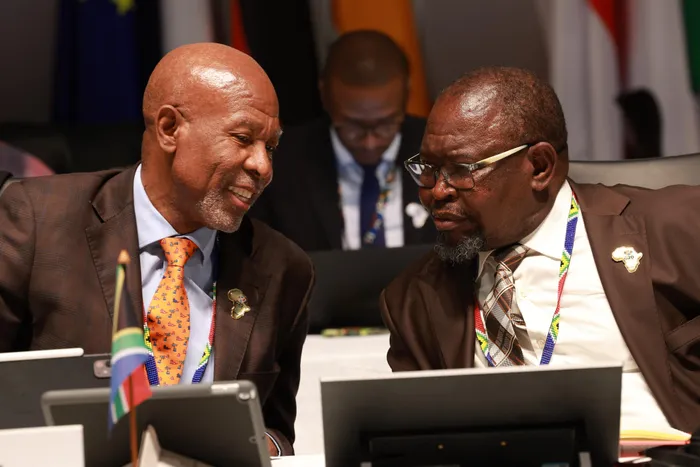G20 meeting fails to reach consensus amid increasing global economic uncertainty
When questioned about these issues, he declined to name specific countries or problem areas, but mentioned that some countries had differing views on climate financing.

South Africa Reserve Bank governor Lesetja Kganyago and Finance Minister Enoch Godongwana at the release of a summary of issues discussed at the G20 meeting of Finance Minister that was held in Cape Town.The G20 Finance Ministers and Central Bank Governors meeting concluded on Thursday.
Image: Supplied/SARB
The meeting of G20 Finance Ministers and Reserve Bank Governors failed to reach consensus on a joint communiqué, and a chairman’s statement was released instead.
This statement resolved to maintain and broaden discussions on concrete policy measures among the member countries and foster cooperation.South Africa's Finance Minister Enoch Godongwana, in a briefing on Thursday, expressed disappointment that consensus for a communiqué could not be reached.
He said that similar chairman’s statements were released after the Indonesia meeting in 2022 and in India the following year, when consensus could also not be achieved, although “several new differences emerged on a number of topics” that the ministers could not agree on this year.
When questioned about these issues, he declined to name specific countries or problem areas, but mentioned that some countries had differing views on climate financing.
The meeting took place against a backdrop of foreign aid cuts from both the UK and US, and notable absences at the meeting including US Treasury Secretary Scott Bessent, as well as finance ministers from China, Brazil, and Canada.
Godongwana stated that the absences did not have a material impact on the discussions. He explained that Bessent had decided at the last minute not to attend the G20 meeting due to his obligation to attend his country’s first Cabinet meeting under the new administration.
Countries such as Brazil and China had sent vice ministers and deputies, and there were no empty flags among the Reserve Bank governors.
The chairman’s statement painted a more subdued picture of the global economy than a communiqué issued last October, which had forecasted a soft landing for the global economy.
South Africa's Reserve Bank Governor Lesetja Kganyago indicated that this was due to a much more uncertain economic outlook, as the International Monetary Fund (IMF), World Bank, and OECD (Organisation for Economic Co-operation and Development) had revised downward their global economic growth forecasts.
When asked whether Africa had enough of a voice in the discussions at the G20 meeting, Godongwana acknowledged that the matter of African representation in the G20 was an ongoing challenge.
He said that through South Africa’s Presidency of the G20 this year, all five African regional economic community organisations, such as the Southern African Development Community and the Economic Community of West African States (ECOWAS), had been invited to participate in the G20 talks.
Godongwana emphasised that one of the principles of the G20 has always been to resist trade protectionism and economic fragmentation.
In the chairman’s summary, the multilateral development banks were encouraged to work with developing countries to enhance domestic resource mobilisation and increase private capital investment by supporting enabling conditions, addressing obstacles to private investment, and scaling up both innovative and risk-sharing instruments and country platforms.
Regarding climate risk to developing countries, many of which cannot afford to pay for climate change-related catastrophes, the summary noted that the ministers “looked forward to the development of practical recommendations to enable countries to address natural catastrophe insurance protection gaps in line with their own priorities.”
The two-day meeting followed the US administration's announcement of plans to gut its USAID arm, and Britain slashed its aid budget by 40% to divert funds towards defence spending.
Disputes over trade, the Ukraine war, and how to tackle climate change have long made it difficult for the G20 grouping to make serious progress on global challenges.
BUSINESS REPORT
Related Topics: